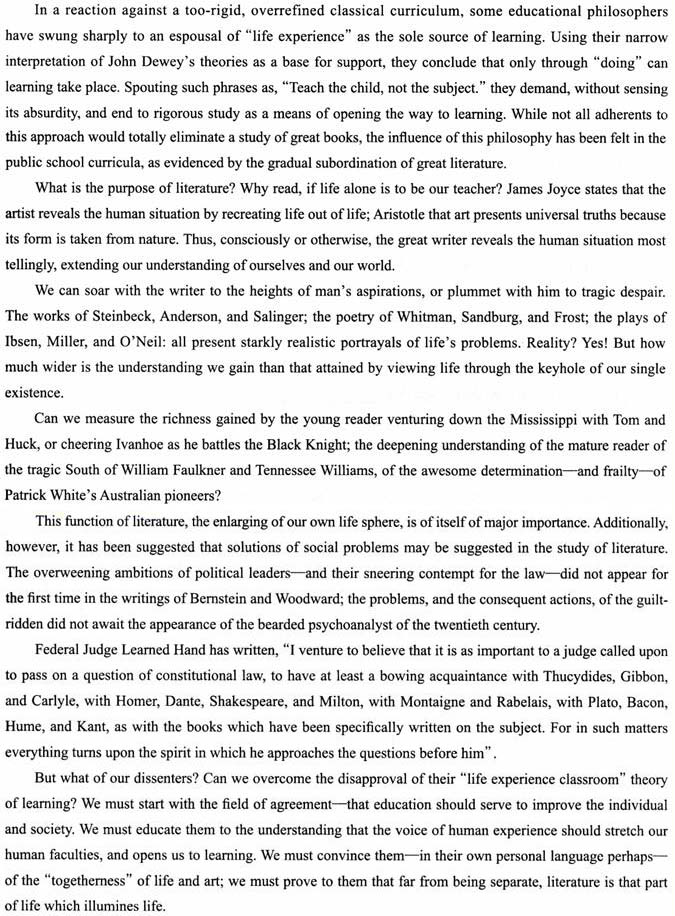第1题:
In every cultivated language, there are two great classes of words which, taken together, comprise the whole vocabulary. First, there are those words(1)which we become acquainted in daily conversation, which we(2),that is to say, from the(3) of our own family and from our familiar associates, and(4) we should know and use (5 )we could not read or write. They (6) the common things of life, and are the stock in trade of all who (7) the language. Such words may be called“popular”, since they belong to the people (8) and are not the exclusive (9) of a limited class. On the other hand, our language (10) a multitude of words which are comparatively (11) used in ordinary conversation. Their meanings are known to every educated person, but there is little (12) to use them at home or in the market-place. Our (13) acquaintance with them comes not from our mother's (14) or from the talk of our school-mates, (15) from books that we read, lectures that we (16) ,or the more (17)conversation of highly educated speakers who are discussing some particular (18) n a style appropriately elevated above the habitual(19) f everyday life. Such words are called“learned”, and the (20) between them and the“popular”words is of great importance to a right understanding of linguistic process. 请在2处填上正确答案()
第2题:
In every cultivated language, there are two great classes of words which, taken together, comprise the whole vocabulary. First, there are those words(1)which we become acquainted in daily conversation, which we(2),that is to say, from the(3) of our own family and from our familiar associates, and(4) we should know and use (5 )we could not read or write. They (6) the common things of life, and are the stock in trade of all who (7) the language. Such words may be called“popular”, since they belong to the people (8) and are not the exclusive (9) of a limited class. On the other hand, our language (10) a multitude of words which are comparatively (11) used in ordinary conversation. Their meanings are known to every educated person, but there is little (12) to use them at home or in the market-place. Our (13) acquaintance with them comes not from our mother's (14) or from the talk of our school-mates, (15) from books that we read, lectures that we (16) ,or the more (17)conversation of highly educated speakers who are discussing some particular (18) n a style appropriately elevated above the habitual(19) f everyday life. Such words are called“learned”, and the (20) between them and the“popular”words is of great importance to a right understanding of linguistic process. 请在19处填上正确答案()
第3题:


第4题:
第5题:
第6题:
第7题:
30. What is the passage mainly about? 、
A. We must make more friends.
B. Don-t quarrel with our parents.
C. What should we do when our parents quarrel.
D. Sometimes we must stay away from our parents.
第8题:
Passage Five
In every language there are two great classes of words which, taken together, consist of the whole vocabulary. First, there are those words with which we become acquainted in daily conversation, which we learn, that is to say, from the members of our own family and from our familiar associates, and which we should know and use even if we could not read or write. They concern the common things of life, and are the goods in trade of all those who speak the language. Such words may be called "popular", since they belong to the whole people; and are not the exclusive possession of a limited class.
On the other hand, our language includes a large number of words which are comparatively seldom used in ordinary conversation. Their meanings are known to every educated person, but there is little occasion to use them at home or in the market-place. Our first acquaintance with them comes not from our mother's lips or from the talk of our school-mates, but from books that we read, lectures that we bear, or the more formal conversation of highly educated speakers who are discussing some particular topic in a style. raised above the habitual level of everyday life. Such words are called "learned". And the distinction between them and "popular" words is of great importance to a right understanding of the language.
51. One class of words can be learned ______.
A. through everyday life
B. without too much practice
C. from popular songs
D. with a dictionary in one's hand